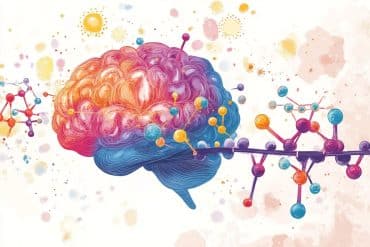Summary: Suppressing the activity of hypothalamic neurons in mice during REM sleep resulted in a decrease in the amount of food later consumed. The study suggests REM sleep is essential to stabilize food intake.
Source: University of Bern
Despite our broad understanding of the different brain regions activated during rapid-eye-movement sleep, little is known about what this activity serves for. Researchers at the University of Bern and the Inselspital have now discovered that the activation of neurons in the hypothalamus during REM sleep regulates eating behaviour: suppressing this activity in mice decreases appetite.
While we are asleep, we transition between different phases of sleep each of which may contribute differently to us feeling rested. During (rapid eye movement) REM sleep, a peculiar sleep stage also called paradoxical sleep during which most dreaming occurs, specific brain circuits show very high electrical activity, yet the function of this sleep-specific activity remains unclear.
Among the brain regions that show strong activation during REM sleep are areas that regulate memory functions or emotion, for instance. The lateral hypothalamus, a tiny, evolutionarily well conserved brain structure in all mammals also shows high activity during REM sleep. In the awake animals, neurons from this brain region orchestrate appetite and the consumption of food and they are involved in the regulation of motivated behaviours and addiction.
In a new study, researchers headed by Prof. Dr. Antoine Adamantidis at the University of Bern set out to investigate the function of the activity of hypothalamic neurons in mice during REM sleep. They aimed at better understanding how neural activation during REM sleep influences our day-to-day behaviour. They discovered that suppressing the activity of these neurons decreases the amount of food the mice consume. “This suggests that REM sleep is necessary to stabilize food intake”, says Adamantidis. The results of this study have been published in the journal Proceedings of the National Academy of Sciences (PNAS).
Long-lasting effect on neuronal activity and feeding behavior
The researcher discovered that specific activity patterns of neurons in the lateral hypothalamus that usually signal eating in the awake mouse are also present when the animals were in the stage of REM sleep. To assess the importance of these activity patterns during REM sleep the research group used a technique called optogenetics, with which they used light pulses to precisely shut down the activity of hypothalamic neurons during REM sleep. As a result, the researchers found that the activity patterns for eating were modified and that the animals consumed less food.
“We were surprised how strongly and persistently our intervention affected the neural activity in the lateral hypothalamus and the behaviour of the mice”, says Lukas Oesch, the first author of the study. He adds: “The modification in the activity patterns was still measurable after four days of regular sleep.” These findings suggest that electrical activity in hypothalamic circuits during REM sleep are highly plastic and essential to maintain a stable feeding behaviour in mammals.
It is a question of quality
These findings point out that sleep quantity alone is not solely required for our well-being, but that sleep quality plays a major role in particular to maintain appropriate eating behaviour. “This is of particular relevance in our society where not only sleep quantity decreases but where sleep quality is dramatically affected by shift work, late night screen exposure or social jet-lag in adolescents”, explains Adamantidis.

The discovered link between the activity of the neurons during REM sleep and eating behaviour may help developing new therapeutical approaches to treat eating disorders. It might also be relevant for motivation and addiction. “However, this relationship might depend on the precise circuitry, the sleep stage and other factors yet to be uncovered”, adds Adamantidis.
This study was carried out in partnership with the IRC “Sleep and Health” at the University of Bern.
Funding: It was supported by the University of Bern, the Inselspital University Hospital Bern, the Swiss National Science Foundation, the European Research Council (ERC), the Human Frontiers Science Program and the German Research Society.
About this neuroscience research article
Source:
University of Bern
Contacts:
Antoine Adamantidis – University of Bern
Image Source:
The image is in the public domain..
Original Research: Open access
“REM sleep stabilizes hypothalamic representation of feeding behavior” by Lukas T. Oesch, Mary Gazea, Thomas C. Gent, Mojtaba Bandarabadi, Carolina Gutierrez Herrera, and Antoine R. Adamantidis. PNAS.
Abstract
REM sleep stabilizes hypothalamic representation of feeding behavior
During rapid eye movement (REM) sleep, behavioral unresponsiveness contrasts strongly with intense brain-wide neural network dynamics. Yet, the physiological functions of this cellular activation remain unclear. Using in vivo calcium imaging in freely behaving mice, we found that inhibitory neurons in the lateral hypothalamus (LHvgat) show unique activity patterns during feeding that are reactivated during REM, but not non-REM, sleep. REM sleep-specific optogenetic silencing of LHvgat cells induced a reorganization of these activity patterns during subsequent feeding behaviors accompanied by decreased food intake. Our findings provide evidence for a role for REM sleep in the maintenance of cellular representations of feeding behavior.






